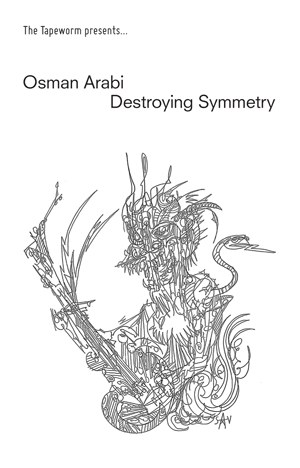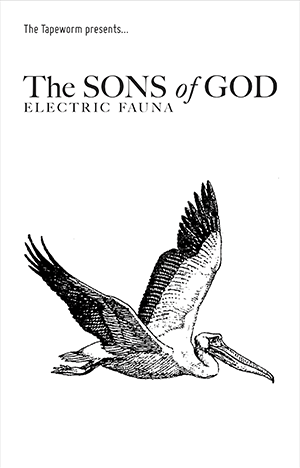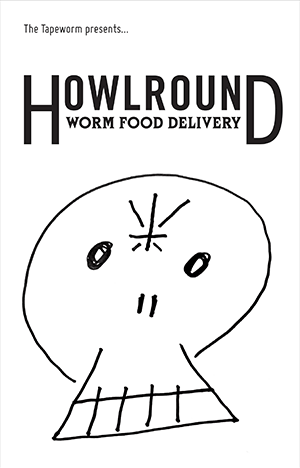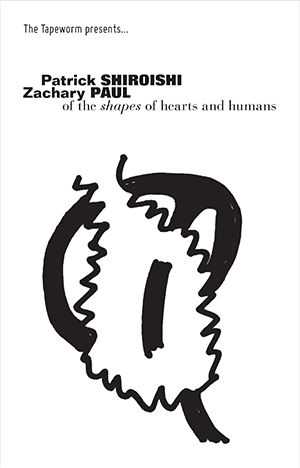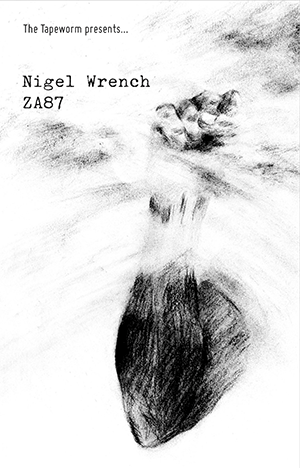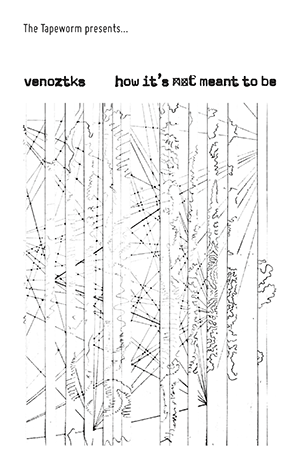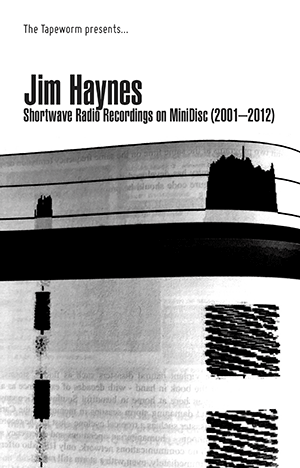TTW#66 – Osman Arabi – Destroying Symmetry
Cassette only – limited edition of 150 copies
SOLD OUT AT SOURCE
Nine untitled tracks
43min playing time
Illustration – SavX
Improvised, channeled and recorded in one take at Tunefork Recording Studios on the 9th of August, 2013 – Beirut, Lebanon. Mixed and mastered by Fadi Tabbal on the 10th of October, 2013 – Beirut, Lebanon.
A unique figure in the international noise and industrial music scenes, Osman Arabi is a composer, producer and sound designer from Tripoli, Lebanon. His work elicits images of desolate industrial landscapes and shamanistic rites. From his beginnings in black metal, Arabi has progressed through such genres as dark ambient, industrial, tribal, psychedelic, electro-acoustic, power electronics and noise. His many projects have included Seeker, Kafan, Veinen, Shamanic Death Trance, The Ritual Inclusion of Code, harsh electronics outfit 20.SV, as well as nihilist Dutch collective Stalaggh. In 2000 Arabi stopped performing live - vanishing into the underground, not resurfacing until 2009…
For the past decade, Arabi has been developing – in complete secrecy – his ‘occult guitar’ playing, based on the sigil work of Austin Osman Spare. This new thread to his work was only recently unveiled, in late 2013, and is set to become the backbone of his live rituals hereon in.
Osman Arabi writes…
“Symmetry is humanity’s nightmare, God’s shape, the cosmic trap, the great fear, the ever controlling weakness, the illusion of perfection, the fraction of randomised patterns in endless chaos.
There was I and the other self who played guitar in praise of his idols and heroes. There was I and the ‘I play guitar’ sentence. They never met nor was there a unity between the two.
It was my existential crisis for the past 17 years… What I have always listened to, opposed what I wanted to play. I did not know how to play what I wanted to play; I only knew what I did not want to play.
Austin Osman Spare’s sigil approach is a gateway to the subconscious to manifest a specific will. Reversing the actual process of sigil making intensifies the energy of the will yet not the will itself. Through drawing sigils based on what best visually represents the energy within, the sigil works as an intensifier of the inner flame. Overloading the conscious mind with different energy sigils will push the inner flame to a climax resulting in an intense formless subconscious flow. With repetition, the conscious mind memorises the visual representations and pushes them into the subconscious resulting in an automatic electrified flow when required.
Destroying Symmetry is the channelling of an electrified energy captured on the afternoon of August the 9th, 2013.” – Osman Arabi, Tripoli, Lebanon, 9 April 2014.
Reviews
The Wire (UK):
A Lebanese musician who has worked extensively in noise, industrial and black metal, Osman takes a rather divergent approach on this tape. Playing solo electric guitar, with reportedly occult overtones, he has made one of the most interesting string music albums of the year. His playing reminds me of something like a cross between Bill Orcutt and Matt Valentine. He has Orcutt’s melodic astringency, but it is balanced against a semi-ecstatic feel that recalls Matt’s playing at its most hermetic.
Vital Weekly (NL):
I must admit I never heard of Osman Arabi, from Tripoli in Lebanon. More than a decade ago he was occupied with recording industrial music, noise, psychedelic music, dark ambient, and worked with the likes of “Seeker, Kafan, Veinen, Shamanic Death Trance, The Ritual Inclusion of Code, harsh electronics outfit 20.SV, as well as nihilist Dutch collective Stalaggh” – none of which I heard before. In 2000 he stopped performing live and in 2009 he resurfaced, armed with an electric guitar and playing “occult guitar, based on the sigil work of Austin Osman Spare”. Which is not something one can detect all too easily here, but maybe I belong to the uninitiated? August 9th last year he improvised the nine pieces on this cassette and it sounds awesome. Blues music for sure, but blues music of an even more unsettling kind. Obviously one could think of Bill Orcutt, or maybe Derek Bailey, but Arabi sometimes repeats phrases – oh the horror in improvised music – which brings a great musical element to the table. This is a dark and haunting release, not for the weak of mind. Desolate beauty.
ATTN:Magazine (UK):
To read about Arabi’s initial guitar dilemma is to consider whether I, too, am a mere puppet for my own listening habits. Is my guitar playing a pure extension of my own creative will, or an amalgamative reflection of the guitar playing of others? Arguably, the consideration becomes even more worrying during the act of improvisation: perhaps this supposed current of pure impulse is merely a library of the learned and the idolised; a playbook from which I throw forth imitations of the listening material I find stimulating.
Arabi has found a way of shattering this samsaric feedback loop based on Austin Osman Spare’s sigil work, drilling a hole through which the subconscious will can pass into the air uninhibited. The results are documented here as a solitary take, with just a delicate reverb residing between his strings and my own ears. Sometimes it sounds like Arabi has rearranged the positions of his own fingers, writhing across the fretboard in a succession of wretched splays, twitching in sudden zags of transformation. At others, his plucking hand shivers and stops suddenly, causing alternations between sighing open strings and scrunched up harmonies of blues and stifled vibration – a babble of choke and chicaning release.
This may have felt stiff and discordant in another context, like a body forcing back against its own muscle mechanisms, manoeuvring between ideas with the incoherence of a dying slide projector. Yet somehow (and in a way that perhaps needs to be physically heard to be entirely understood), each gesture is the curve and ripple of a solitary thread; a direct translation of Arabi’s own electricity in the now, without the disruptive skew of unwanted outside influence. It feels thoroughly real-time. Now Arabi has discovered a channel for genuine self-impulse, he can now play in the knowledge that he will never repeat himself – just as all transient beings develop and reshape in dialogue with time and environment, his guitar playing can adapt accordingly.


